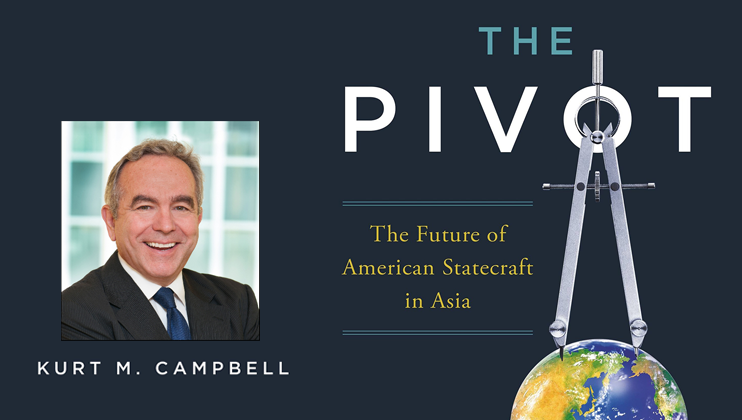Thursday, July 14, 2016 | 5:30 PM EDT - 7:00 PM EDT
Covington & Burling LLP |, New York, NY
Over the course of the past several presidential administrations, American foreign policy was characterized primarily by its engagement in the Middle East. When Barack Obama assumed office, he argued that the United States disproportionally allocated its resources toward the Middle East at its own peril. The 21st century, he argued, would be defined by the rise of Asian powers, like China. Therefore, the President believed that it was in America’s strategic best interest to shift its focus eastward to reflect the shift in the global balance of power.
Former Assistant Secretary of State for East Asian and Pacific Affairs Kurt M. Campbell, one of the chief architects of the pivot (also known as the rebalance), states in his new book, The Pivot: The Future of American Statecraft in Asia, that one of the central tenets of the Obama Administration’s pivot was building relationships with emerging Asian powers. Such initiatives as the U.S.-India-Japan trilateral dialogue, the Trans-Pacific Partnership, and various defense agreements with Asian nations, were praised by the Obama Administration, but met with deep criticism and suspicion from China. To Beijing, the ‘pivot to Asia’ was an aggressive containment strategy aimed at curbing China’s growing regional capabilities. Now, as tensions simmer across East Asia, from the Korean peninsula to the South China Sea, how has the rebalance affected America’s capacity to assert its influence in the region? Dr. Kurt M. Campbell discussed his new book, his experience in crafting and implementing the ‘pivot to Asia’, and the future of America’s role in the region, with the National Committee on July 14, 2016 in New York City.

Kurt M. Campbell
Kurt M. Campbell is chairman and chief executive officer of The Asia Group, LLC, a strategic advisory and capital management group specializing in the Asia-Pacific. He also serves as chairman of the Center for a New American Security, as a non-resident fellow at Harvard’s Belfer Center, as a member of the Defense Policy Board at the Pentagon, the board of directors for Standard Chartered PLC in London, and the board of directors for the National Committee on U.S.-China Relations. From 2009 to 2013, he served as assistant secretary of state for East Asian and Pacific Affairs. For advancing a comprehensive U.S. strategy that took him to every corner of the Asia-Pacific region, in 2013 Secretary Hillary Clinton awarded him the Secretary of State’s Distinguished Service Award, the nation’s highest diplomatic honor. Dr. Campbell was recognized in the Queen’s New Year’s list of honors in 2014 as an Honorary Officer of the Order of Australia and as an Honorary Companion of the New Zealand Order of Merit for his work in support of American relations with Australia and New Zealand, respectively. He also received top honors from Korea and Taiwan.
Dr. Campbell was formerly the CEO and co-founder of the Center for a New American Security and served concurrently as director of the Aspen Strategy Group and chairman of the editorial board of the Washington Quarterly. He was the founder and chairman of StratAsia, a strategic advisory and consultancy that supported American firms across Asia. He was the senior vice president, director of the International Security Program, and Henry A. Kissinger Chair at the Center for Strategic and International Studies. Campbell was also associate professor of public policy and international relations at the John F. Kennedy School of Government and assistant director of the Center for Science and International Affairs at Harvard University. He was previously the vice chairman of the Pentagon Memorial Fund and has served on the board of directors of Metlife, Inc., of New York.
Dr. Campbell previously served as deputy assistant secretary of defense for Asia and the Pacific, director on the National Security Council staff, deputy special counselor to the president for the North American Free Trade Agreement in the White House, and White House fellow at the Department of the Treasury. He was an officer in the U.S. Navy Reserves, serving on surface ships, the Joint Chiefs of Staff, and in the Chief of Naval Operations Strategic Advisory Unit. For his service, he received Georgetown University’s Asia Service Award, the State Department Honor Award, the Republic of Korea medal for service, and the Department of Defense Medals for Distinguished Public Service and for Outstanding Public Service.
He is the author or editor of ten books including Difficult Transitions: Why Presidents Fail in Foreign Policy at the Outset of Power, and Hard Power: The New Politics of National Security. Dr. Campbell is a member of the Aspen Strategy Group, the Council on Foreign Relations, the International Institute for Strategic Studies, and the Trilateral Commission.
He received his B.A. from the University of California, San Diego, a certificate in music and political philosophy from the University of Erevan in Armenia, and his doctorate in international relations from Brasenose College at Oxford University where he was a Distinguished Marshall Scholar. Campbell received his varsity blue in tennis at Oxford and rowed in the first eight in his college crew at Brasenose College when they won the London Hammersmith Regatta.
